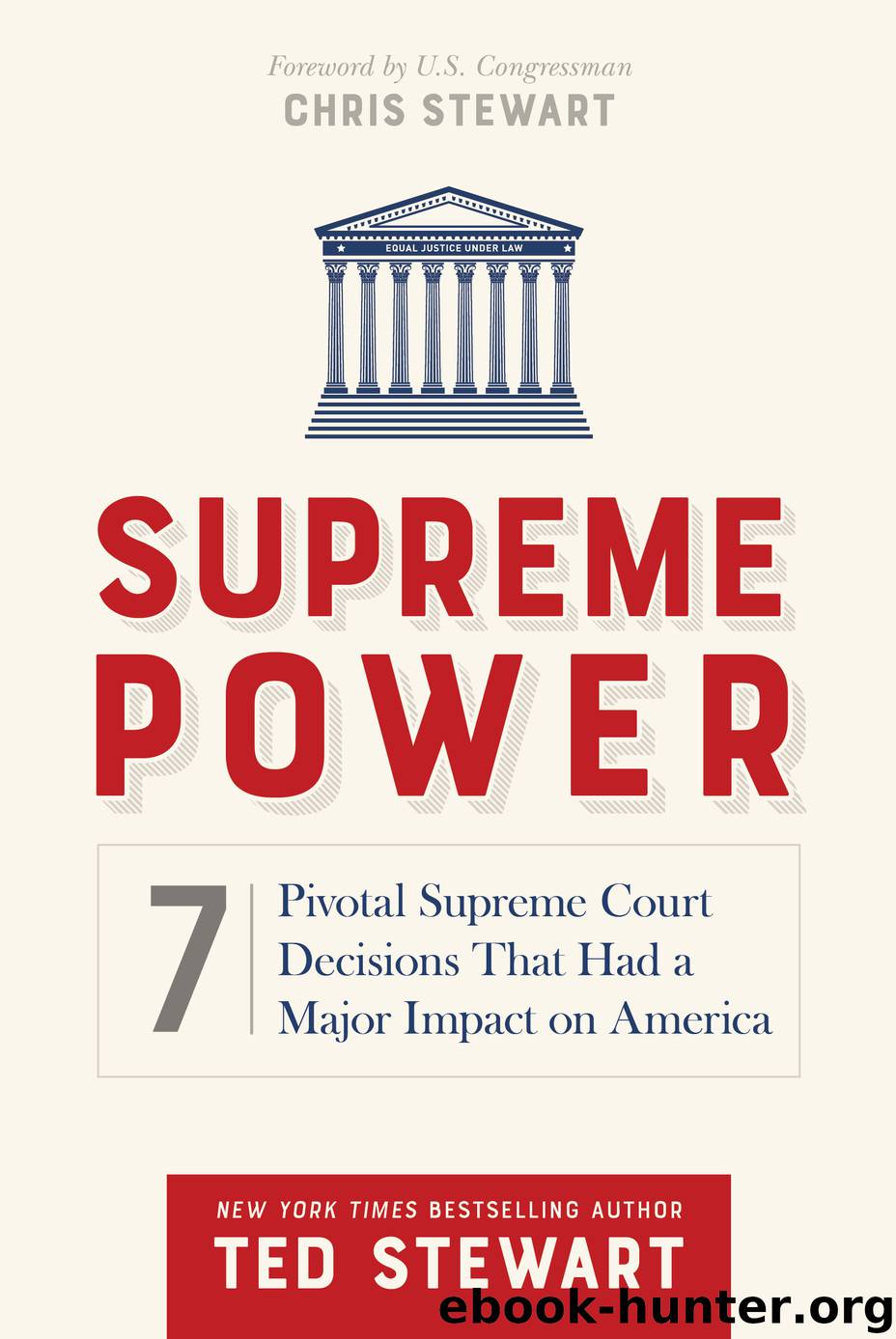Supreme Power by Ted Stewart

Author:Ted Stewart
Language: eng
Format: epub
Publisher: Shadow Mountain Publishing
Published: 2017-09-05T16:00:00+00:00
Roscoe C. Filburn’s Legacy
It is ironic that Roscoe C. Filburn’s effort to restrict the power of Congress to regulate the daily affairs of Americans resulted in a decision that stretched that power beyond comprehension.
Following Filburn, it was going to be nearly six decades before the Supreme Court rendered a decision saying that Congress had gone too far expanding its reach under the Commerce Power.
In the interim, no holds were barred. The federal government now regulates every aspect of commercial activity in the United States. If state regulation is inconsistent with a federal law or regulation, the state regulation is voided.
Besides the unfettered regulation of economic activity by the federal government, and the assertion of primacy over state regulation, the Supreme Court has sanctioned Congressional expansion of noncommercial activities under the guise of the exercise of the Commerce Power.
For example, the Court reversed its 1918 decision and ultimately decided that Congress can prohibit the interstate shipment of goods produced by employees making too little in wages, or working more than forty hours a week, or using child labor. In 1918, the Supreme Court had said that in such matters as wages and labor conditions, the states had supremacy. The reformed Supreme Court saw it differently.
As described in chapter 2 of this book, there had been a lengthy discussion regarding the Civil Rights Act of 1875. That crucial legislation had been held to be unconstitutional because the Court found that it was not justified under the Fourteenth Amendment. No consideration of it being justified by the Commerce Power was argued for. Ninety years later, Congress passed the Civil Rights Act of 1964. It was immediately challenged for its constitutionality. The question considered by the Court was whether the refusal of a motel or restaurant to serve an African-American was a burden on interstate commerce and thus subject to regulation by Congress. The Court concluded that it was, and therefore was within the power of Congress under the Commerce Clause.
During the period of unfettered expansion of federal power, there were some on the Supreme Court who objected. The concept of Federalism, although on its deathbed, still had some Justices who believed in its necessity. In a 1985 case in which the Court decided that federal minimum wage and overtime provisions could be forced on the state governments, four Justices dissented and noted that: “A unique feature of the United States is the federal system of government guaranteed by the Constitution and implicit in the very name of our country. Despite some genuflecting in the Court’s opinion to the concept of federalism, today’s decision effectively reduces the Tenth Amendment to meaningless rhetoric when Congress acts pursuant to the Commerce Clause.”79
They were voices in the wilderness.
The Congress, Crime, and the Commerce Power
Historically, one of the areas reserved to the states under their general police power is the power to define what acts constitute a crime and what punishment should be meted out for that crime. In 1971, in the case of Perez v. United States,
Download
This site does not store any files on its server. We only index and link to content provided by other sites. Please contact the content providers to delete copyright contents if any and email us, we'll remove relevant links or contents immediately.
The Secret History by Donna Tartt(16623)
The Social Justice Warrior Handbook by Lisa De Pasquale(11489)
Thirteen Reasons Why by Jay Asher(7788)
This Is How You Lose Her by Junot Diaz(5772)
Weapons of Math Destruction by Cathy O'Neil(5037)
Zero to One by Peter Thiel(4824)
The Myth of the Strong Leader by Archie Brown(4789)
Promise Me, Dad by Joe Biden(4447)
Beartown by Fredrik Backman(4419)
Stone's Rules by Roger Stone(4415)
How Democracies Die by Steven Levitsky & Daniel Ziblatt(4399)
The Fire Next Time by James Baldwin(4343)
100 Deadly Skills by Clint Emerson(4078)
A Higher Loyalty: Truth, Lies, and Leadership by James Comey(4033)
Rise and Kill First by Ronen Bergman(4012)
The David Icke Guide to the Global Conspiracy (and how to end it) by David Icke(3882)
The Farm by Tom Rob Smith(3872)
Secrecy World by Jake Bernstein(3782)
The Doomsday Machine by Daniel Ellsberg(3731)
